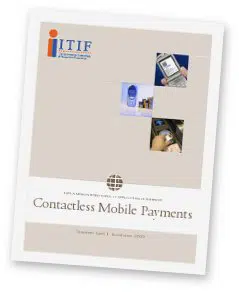The Washington think tank recommends ways in which government can help to get NFC and mobile contactless services off the ground.

The Information Technology & Innovation Foundation (ITIF), a Washington DC based think tank, has published a white paper outlining ways in which government intervention could help to kickstart mobile contactless services and ensure that adoption in the US does not lag behind other parts of the world.
The 60-page report, Explaining International IT Application Leadership: Contactless Mobile Payments (PDF), details the current state of play in other parts of the world, particularly in Japan and Korea, and calls on the US government to put measures in place that will enable American businesses to gain the benefits an established mobile contactless infrastructure would bring.
“Countries can’t just snap their fingers and put a mobile payments infrastructure in place or expect that because the technology is now ready the private sector will simply deploy it,” the white paper explains. “The reason is that mobile payments are not like other industries where a company need only acquire requisite inputs, manufacture a product or design a service, and sell it on the market.”
“Mobile payments,” it adds, “entail a complex, system-interdependent ecosystem with many players— including mobile network operators (MNOs), handset manufacturers, financial institutions including major banks and credit card issuers, merchants, public transit authorities, government agencies, third party application providers, and consumers — whose success is dependent on joint action by all the players together at the same time. Everyone must act collaboratively in the ecosystem simultaneously, but this is not something at which markets tend to be very good.”
ITIF recommends that the US government takes the following actions in order to help mobile contactless systems get up and running:
- The creation of an inter-government mobile payments working group and private-sector advisory council that would collaborate to introduce, by mid-2010, a strategy for spurring the deployment of an open, interoperable mobile wallet.
- Government should assume a leadership role in promoting and adopting mobile payments.
- Senior government leaders should highlight the benefits of contactless mobile payments. Senior leaders at the FCC, departments of commerce and transportation, and other agencies should provide vision and leadership and speak openly about the transformative potential of contactless mobile payments in the United States.
- The US government should make it a requirement that mass transit agencies receiving federal funding must deploy NFC-enabled contactless fare payment systems that are interoperable with those of other transit agencies throughout the country.
- Funding should be provided for pilot programs deploying an NFC infrastructure in publicly or semi-publicly operated or managed environments.
- Deploy a contactless payments infrastructure, including NFC-enabled electronic wallet phones and NFC-enabled POS readers throughout government agencies. Recommended actions include a move by the General Services Administration to adopting contactless POS terminals in all cafeterias, parking garages and other cash facilities it directly operates in federal agencies and facilities, including Department of Defense facilities. Government identification programs such as the Department of Defense’s Common Access Card and the Transportation Worker Identification Credential (TWIC) should also allow electronic wallet applications to be housed on the card and both state and local governments using POS terminals to process payments for services such as marriage licenses, parking permits and drivers licenses should deploy NFC-enabled POS terminals, enabling citizens to make contactless payments.
- Articulate clear consumer protections for mobile payments to assure consumers that using mobile payments will give them the same level of recourse in case of disputes with merchants that they currently enjoy.
- Address legitimate security and privacy concerns, but recognise that mobile wallets are likely to be more secure than physical wallets.
- Resist the urge to regulate RFID technologies, including near field communication.
- Encourage competition and do not favour entrenched interests.
- Actively work with international NFC standards setting bodies. Federal bodies involved in trade policy, including the National Institute of Standards and Technology and the United States Trade Representative should support the development of interoperable international standards for mobile payments, leading to benefits for both domestic device manufacturers looking to export to global markets and consumers seeking convenient payment experiences.
Next: Visit the NFCW Expo to find new suppliers and solutions